Listed below are the candidates for Vice President and Executive Council 2019-2020. Voting will be available and carried out as usual at the CSA conference.
| Vice-President, Executive Council 2019-2020 The Vice-President serves for one year after which she/he assumes the Presidency: |
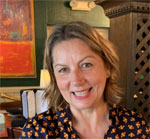 Rita Keresztesi Rita KeresztesiI am an Associate Professor of English at the University of Oklahoma. I have been a member of CSA since 2006 and been attending the annual meetings regularly, except for the years when I was a Fulbright Scholar in Burkina Faso or taught education abroad summer courses in Europe or Africa. I was a member of the Program Committee in preparation for the conference in Grenada in 2013. I have served on the Gordon K. and Sybil Lewis Best Book Award Committee since 2011 through the present, the Best Dissertation Award Committee since 2008 through 2018, and the Film and Visual Arts Track Committee as well as the Literary Salon Committee in 2014 and 2015. I specialize in African and African Diaspora cultural studies. I got my Ph.D. in Literature from the University of California at Santa Cruz in 1999. I am the author of the monograph Strangers at Home: American Ethnic Modernism between the World Wars (Nebraska UP 2005) and co-editor of the book The Western in the Global South (Routledge 2015). I have published articles on Afro-Caribbean literary and cultural studies and post-colonial West African cinema. I was a Fulbright Scholar at the University of Ouagadougou, Burkina Faso in 2010-2011.Candidate Statement: The Caribbean Studies Association has always been in the vanguard of regional thinking and action. With almost a half century history of academic innovations and practical impact in the region, I envision the continuation and enhancement of the scope and effects of our leadership in academic research and communal collaborations. The Association has made important efforts in bridging linguistic and geographical territories, as well as in interdisciplinary and intergenerational collaborations. The CSA is unique in its interdisciplinary focus and its commitment to positively impact and interact with the communities in which it holds its annual meetings. The mentoring of graduate students, with which I have been involved over the years, is another valued aspect of this Association. Many of our young scholars got their launch at annual meetings, due to the supportive environment and continued interactions with senior faculty. The annual meetings have been helpful for shopping manuscripts with publishers represent at the congress, resulting in journal articles and monographs. Having been part of CSA for almost fourteen years, I have seen a generational change and changes in focus: the Association has grown a strong group of young leaders and there has been more attention paid to issues of gender and sexuality, the dire consequences of climate change, to the visual and creative arts, the importance of local and global governance, the social sciences, health sciences, and the humanities. Keeping with the philosophy of looking to the past to build the future, I would like to focus on the following issues specifically:
|
|
Dr. Eris D. Schoburgh, is Professor of Public Policy and Management, in the Department of Government and Associate Dean in the Faculty of the Social Sciences, at The University of the West Indies, Mona Campus where she teaches courses in public and policy management at the undergraduate and graduate levels. She currently coordinates the Public and Policy Management Unit. Her general area of academic specialisation is public policy analysis and management with special focus on comparative subnational government/governance; subnational/local (economic) development. She has several publications among which are three books and several research articles that have appeared in leading international and regional journals. Professor Schoburgh is a Member of the Commonwealth Local Government Forum (CLGF), the International Public Policy Association (IPPA), the International Research Society for Public Management (IRSPM), and the Caribbean Studies Association (CSA). Her public service includes appointments as Co-chair of the Governance Thematic Working Group of Vision 2030 Jamaica National Development Plan, Planning Institute of Jamaica; former Chairperson of the Mountain Terrace Cooperative Housing Society Limited; and former Director of the Board of the Social Development Commission (SDC). Candidate Statement: I envision a Caribbean Studies Association that has a reputation for innovative and collaborative multidisciplinary and interdisciplinary research that responds to the needs of Latin American and Caribbean societies. The mission of the Caribbean Studies Association is to adopt and implement strategies that promote high quality research and scholarly outputs and provide opportunities for dissemination. The Association should seek to:
|
| Member, Executive Council 2019-2020 Executive Council Members serve for a two year term. |
|
Dr. Nikoli Attai is a Provost’s Postdoctoral Fellow in Women and Gender Studies at the University of Toronto, Canada. His current research includes the curation of an archive of Trinidad and Tobago’s queer history, tracing legacies of queer community making and resistance in the Caribbean. Dr. Attai is also currently working on his first book manuscript, tentatively titled Queering LGBT Human Rights Activism in the Anglophone Caribbean and is co-editing an anthology of essays titled Free Up Yuhself: Transgressive Bodies and contestations in the Carnivalesque. He holds a Master of Philosophy in Cultural Studies from the University of the West Indies, St. Augustine Trinidad and Tobago, and a Bachelor of Arts in Media and Communication from the University of the West Indies, Mona Jamaica. Dr. Attai’s other research and scholarly interests include queer carnival tourism in Trinidad and Tobago, transgressive community making in the Caribbean and social media visibility by gender-nonconforming people in the Caribbean. Candidate Statement: As a student, I always heard about the annual Caribbean Studies Association (CSA) Conference and was always excited about the stories of enriching academic experiences that my colleagues and mentors had when they attended. I finally attended my first CSA conference in 2015 in New Orleans and have been attending ever since, presenting academic papers of my Ph.D. research. CSA has always been a productive, nurturing and encouraging environment and I always leave each year feeling motivated to continue my work. Now, as a Postdoctoral Fellow at The University of Toronto, I am excited about the prospects of serving as an Executive Council member if elected. CSA is proud to continuously promote Caribbean Studies from a multidisciplinary and multicultural perspective that captures the nuanced essence of Caribbeanness in the region and its diasporas. While the organization has been highly successful in ensuring that this continues to be central to its activities, I have experienced varying management styles and capabilities each year, some of which have unfortunately resulted in less cohesive conference experiences for members. Bearing this in mind, I, therefore, envision an organization that is well managed in three integral areas. Firstly, I believe that the Executive Committee, led by a competent and committed President and Vice-President should work closely to coordinate Association-related business, and to execute successful, well-organized CSA conferences being held each year. Secondly, I envision a CSA that works closely with its various working groups to ensure added diversity on panels, plenaries and at conference events. Finally, as a researcher doing work on various Anglophone Caribbean countries with members of underrepresented groups, I appreciate the importance of also including diverse non-academic participants in the conference. I, therefore, privilege an organization that strategizes on innovative ways to provide opportunities for more access to the conference. This includes more active involvement from students, scholars and activists, women, LGBT+ persons, persons with disabilities and persons from non-academic fields from the region who may have limited access and resources to participate in a conference of this nature. If elected to serve, look forward to working with the Executive council to ensure that these visions be come a reality for the further development of the organization. |
|
Dr. Nigel O. M. Brissett is an assistant professor at Clark University, Worcester, MA, USA. He holds a doctorate in International Education Policy from the University of Massachusetts, Amherst. Nigel has deep roots in the Caribbean region — intellectual, professional, and personal. He completed his Master of Science in Government and his Bachelor of Arts in Literatures in English at the University of the West Indies (UWI), Mona. A Jamaican, Nigel worked across the CARICOM Caribbean with the UWI in its efforts to expand tertiary educational access in the region. He continues his research in this area. Nigel’s research focuses on how contemporary educational policies impact socio-economic opportunities in “developing” countries, particularly those of the post-colonial Caribbean, as well as other states around the world. His current work analyzes the intersection of neo-liberal principles and post-colonial social welfare policies, and the consequences that ensue. His research is especially attentive to issues of educational access and equity for marginalized groups in the era of rapid neo-liberal globalization. I have been a member of CSA for many years. I have spent more than a decade working in the Caribbean region with the University of the West Indies on educational outreach programs. Now working in a US university, I have maintained my intellectual and professional interests in the region. Throughout this time, I have gained intimate knowledge of the challenges and opportunities of the Caribbean and the importance of regional knowledge production and cooperation. The CSA has served as an important institutional mechanism to share our knowledge, concerns and interests, as well as our aspirations and inspirations. It would be my greatest honor and privilege to help further the objectives of CSA by contributing to its strategic visioning and institutional management. Candidate Statement: I envision the CSA continuing its long tradition of intellectual work on the Caribbean and surrounding regions but also reaching out to further engage the Caribbean on emerging discourses around development and social change, literature, culture and the arts, political economic exigencies, environmental changes, migration, regional integration, among others. I see CSA creating further spaces where academics, policy makers, and practitioners can discuss their work and experiences in the various aspects of Caribbean existence past, present and future. For example, there is a lot of work that can be done on examining rapid urbanization as well as internal and external migration. Intellectual work such as this crosscuts all intellectual fields, from fiction writer who immerses us in the experiences of Caribbean emigrants and urban dwellers, to social scientist who explores the effects of skilled migration on the economies of the region. Another example, we urgently need the insights of the environmentalists who critically examine how tourism impacts environmental health of the region to the city planner who researches how climate change may shape urban planning and how we dispose of waste. These are just a few examples of the myriad of ways CSA can be even more relevant. Practical steps that can be taken to advance these ideas include serving as and promoting conferences around these themes, as well as developing more avenues for such engagement (such as through a CSA-managed publication/journal). Yet such a vision requires effective and focused leadership that seeks to retain existing collaborations and contacts but also reaches out to more intellectual and practice communities. My idea for the future of the CSA is to strengthen the links between intellectuals, practitioners, and policy makers in examining the concerns that are most consequential to the Caribbean and its surrounding regions. My experiences working in the Caribbean, project management skills, and research background make me well prepared to be a part of the CSA executive committee to undertake this work. |
|
Dr. Fatimah Jackson-Best is a public health researcher with a specialization in mental health and whose work focuses on communities in Canada and the Caribbean. She holds a PhD from the University of Toronto Dalla Lana School of Public Health, and conducted her dissertation research on Black women’s experiences of maternal depression in Barbados. Following this, Dr. Jackson-Best took an appointment as a Global Health Postdoctoral Research Fellow at the University of Ottawa and conducted a cross-analysis of mental illness, HIV/AIDS, and physical disability stigma with a focus on interventions and intersectionality frameworks. Her work has been published in peer-reviewed journals such as BMC Public Health, JENdA: A Journal of Culture and African Women Studies, Gender and Education, and the Journal of International Women’s Studies. Dr. Jackson-Best also does research consultancy work in Canada and the Caribbean, and recently worked with the Trinidadian NGO I Am One to pilot ‘Your Story’- a research study exploring the lived experiences of LGBTQ people in the Caribbean. She is currently the Project Manager for Pathways to Care, and is designing a mental health intervention for Black children, youth, and their families in Ontario. Candidate Statement: I am excited and honoured to run for a position on the CSA Executive Council for a two year term. The association’s long-standing commitment to amplifying work that is focused on the Caribbean and its Diaspora in many ways mirrors my own interests and experiences working in the region. Over the years I have had the privilege to do research with and work alongside Caribbean women, Caribbean feminists, LGBTQ activists and organizations, and healthcare professionals. What I have heard time and again is the need for increased support for those who are situated in the region and Diaspora and who are engaged in the work that will continue to improve our societies. I believe that CSA provides a unique opportunity to have these groups come together and cross-fertilize ideas, and it is one of the few places that we can do this in spite of our diverse disciplines, backgrounds, and languages. If elected to the CSA Executive I will bring forward my visions for the organization to more meaningfully include areas of studies in the annual conference that are oftentimes marginalized, such as health and mental health as stand-alone thematic areas. I will also push for better inclusion of activists and people working in grassroots organizations because without these individuals and groups, we risk losing the essence of resistance that has characterized our region. But most of all, if elected to CSA Executive Council I will bring my tireless work ethic and commitment which have not failed me professionally or personally. It would be my pleasure to serve on the CSA Executive Council, and to assist the association in moving purposefully towards its bright future. |
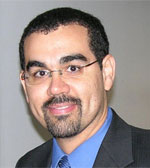 Raymond Laureano-Ortiz Raymond Laureano-Ortiz
Raymond Laureano-Ortiz is an engineer, management consultant, and Doctor in History. His interests in historical research revolve around Puerto Rico and the Caribbean, economic development, international relations, scientific and technological innovation, the business ecosystem of innovation, and issues of diversity and inclusiveness. His research work has been presented in multiple forums in Puerto Rico, the US, the Caribbean (Tobago, Bahamas, Cuba, Barbados, and San Andrés, Colombia), and Europe (the UK and Spain). His first publications as a historian have emerged since 2018 in academic journals and books published in Puerto Rico, Haiti and Cuba. His Ph.D. dissertation on the history of Puerto Rico’s paradiplomacy or international relations in the 80s and 90s received an Honorable Mention for the Caribbean Studies Association’s Best Dissertation Award in 2018. He is currently affiliated as a postdoctoral researcher to the Latin America Center of the Josef Korbel School of International Studies at the University of Denver and as a visiting researcher to two other Puerto Rico-based institutions: the Institute of Caribbean Studies at the University of Puerto Rico and the Jesús T. Piñero Library & Social Research Center at the Ana G. Méndez University – Carolina Campus (building the international-relations and economic-development document collection at the latter). He is linked as a researcher to current projects endorsed by CLACSO (Latin American Council of Social Sciences) and the European Union’s Horizon 2020 Initiative. He is also collaborating as a professor, researcher, and coordinator of initiatives with two Puerto Rico-based institutions: the School of Liberal Arts and General Education of the Ana G. Méndez University – Gurabo Campus and the new Master Program in International Relations and Diplomacy of the Center for Advanced Studies on Puerto Rico and the Caribbean. He has been part of multiple boards (both as president/chair and other roles) in professional organizations (like the Puerto Rico College of Engineers & Land Surveyors, and the Institute of Electrical & Electronics Engineers – Puerto Rico and Caribbean Chapter), academia, and other non-profit entities dedicated to technology & economic development and the promotion of entrepreneurship & innovation thru professional-development, event-coordination, and community-building initiatives. He is currently the Secretary-Treasurer for the Executive Council of the Puerto Rico Section of the Latin American Studies Association (LASA-PR), member of the Executive Committee of the Society for Caribbean Studies based in the United Kingdom (SCS-UK) and Professor and Researcher at Ana G. Méndez (Gurabo Campus) in Puerto Rico. Candidate Statement: The CSA is an ideal platform to give a sense of community to Caribbean scholars worldwide. Despite the longstanding prestige of the organization, there is space to continue reaching out to scholars at higher-education institutions & research centers worldwide and those that work independently; to those in charge of archives, museums, cultural centers, and government agencies that can assist in disseminating research findings to a wider audience; to those scholars from the multiple linguistic subregions of the Greater Caribbean and from outside the region, especially those underrepresented world areas like Africa, Latin America, and Asia/Pacific. The Caribbean has been at the crossroads of so many world processes across time and I want to contribute to the collective effort of assertively disseminating that perspective by serving in the CSA Council. Likewise, I want to actively support CSA leaders and committee members in imperatively exploring and implementing ways to ensure that the annual conference is a viable venture in the long term. The conference continues to have the dual challenge of catering to those scholars and institutions that have more resources and being an accessible space to those, especially in the Greater Caribbean, that have less. |
| Student Representative Candidate 2019-2020 |
|
Laura is a Colombian-Italian Ph.D. student in the Department of Geography at King’s College London. She has a Bachelor in Marine Science from the University of Queensland and an MSc in Environmental Change and Management from Oxford University. For the past ten years, Laura has dedicated her academic and professional career to tackling climate change issues in small developing island states. Her current research focuses on understanding how business network environments influence the adaptive behaviour of small firms in agricultural value chains in Jamaica and seeks to operationalise the use of network analysis for the formulation of national adaptation strategies in the agriculture sector. In conjunction with her Ph.D., she works at Acclimatise, a climate risk management consulting firm based in the UK. In her dual roles as risk analyst and business development associate, Laura has developed her understanding of climate vulnerabilities in the Caribbean, as well as, among other things, her understanding of climate finance within the Region, policy strategies linked to climate action, nature-based solutions tailored to increase coastal resilience and improve water management. Prior to joining Acclimatise, Laura worked for the Australia National Climate Change Adaptation Research Facility, the South East Queensland Climate Adaptation Research Initiative, the French Red Cross and the Inter- American Development Bank in different capacities and roles. She is bilingual in Spanish and Italian, fluent in English, speaks advanced level of French and basic level of Russian and Portuguese. Candidate Statement: The Caribbean Region has suffered the struggles of a history of colonisation and the longstanding exposure to global economic trends and environmental change. Inherent vulnerabilities stemming from its past have turned it in one of the most fragile regions in the world from a social, economic and environmental stand point. These vulnerabilities are being exacerbated by climate change, which threatens to be the greatest challenge that the Caribbean nations have ever encountered. The Region is in fact expected to be one of the most severely impacted by climate change over this century; its effects are already widely experienced through the increasing succession of droughts, hurricanes, coral bleaching, floods and coastal erosion events that are impacting the region. The effects of a changing climate will vary significantly across the Region, according to the socio-economic characteristics of its different states and territories. But they can, as shown by the recent effects of hurricane Irma and Maria, result in total devastation. They can also exacerbate incrementally the impact generated by power disparities and marginalisation of vulnerable communities and the degradation of natural ecosystems, already subject to mismanagement practices. As student representative of CSA, I will help the CSA community to explore Caribbean realities through the lenses of a changing climate, in order to uncover causal dynamics that may stem at the root of the Region’s susceptibility, and that may also be the source of origin for future solutions. I will work towards developing and strengthening the bonds between the research/practice communities working on climate change issues within the region with the community of members at CSA, helping to apply a climate lenses to help us further develop our understanding of Caribbean realities. |
|
Sally K. Stainier is finishing a Ph.D. in Political Science at the Université des Antilles in Guadeloupe – her mother’s homeland. Her doctoral work addresses (French) language policy as public policy and examines how teachers engage, locally, with diglossic structures and practices based on their professional and sociolinguistic constructs. After majoring in International Relations at Saint Joseph’s University (Philadelphia), she graduated from her current alma mater with a BA in Applied Foreign Languages (English & Spanish). She went on to pursue a multidisciplinary, fieldwork-oriented Master’s degree in Social Sciences at Paris Descartes-Sorbonne. Drawing from a couple of three-month research stays in Rwanda – where lie part of her paternal roots – her dissertations respectively explored, through a socio-anthropological lens, the relation between nation-building and post-genocide language policy in education, as well as sense of belonging and return migration amongst young generations of the diaspora. Her research interests include language planning and politics, education in post-colonial or non-sovereign territories, emancipatory teaching practices, decolonial thought, diasporic identities, imaginaries and social perceptions of natural disasters in the Caribbean. A professional translator and conference interpreter active across the region since 2013, she launched her own firm (URURIMI) in 2016 in view of providing a broader range of language services to the Caribbean and beyond. Her current position as Chair of the CSA’s Committee for Translingual Exchange and Translation thus goes hand in hand with both her academic and professional endeavours, mirroring a commitment to regional integration and inclusiveness. Candidate Statement: Due to its colonial history and archipelagic traits, the Caribbean has been consistently construed as a fragmented space – one where geographical, political and cultural hurdles seem to outweigh the potentialities of a shared background. And yet, what is our region but a constellation of unique locations facing similar challenges? The challenge of seizing the global stage in spite of structural disparities and rampant dependency; that of existing outside of the box assigned to us by the Western eye and experience… the challenge of building futures in keeping with who we are rather than what we are expected to be. The Caribbean Studies Association, as a grounded and transdisciplinary community of citizens, scholars, performers and activists, is capable of bringing endemic solutions to such challenges, be they exogenous or the fruit of centuries passed. However, this capability is still hampered by a wall so persistent we could easily be tempted to embrace its presence: the language barrier – or the last frontier. For no idea or work or notion likely to foster or drive our peoples’ emancipation should be constrained by the lack of mutual comprehension still evident in our interactions. Multilingual panels should not be the exception, but the rule; and translingual exchanges should become commonplace rather than the restricted realm of polyglots and linguists. Language is power, and wherever thoughts get lost in translation, their intrinsic fire dwindles helplessly. Hence we must seek to embrace multilingualism as the core, and not a mere feature of our societies. My goal, were I to enter the CSA’s Executive Council as Chair of the Committee for Translingual Exchange and Translation, would therefore be to enable linguistic continuity and awareness across the organisation’s wide range of activities – so as to acknowledge not only the limitless resources offered by the myriad of imaginaries and world views inherent in our language plurality; but also the linguistic aspects or expressions of our social, geopolitical and economic struggles. The presence of a CTET member within the EC has indeed proved utterly beneficial in previous instances, both in terms of efficiently coordinating the CSA’s various actions – annual conferences included – and further strengthening membership beyond communicational and cultural borders. |
|
Kat J. Stephens, is a doctoral student in the Higher Education program in the Department of Educational Policy, Research & Administration, at the University of Massachusetts, Amherst. My CSA involvement stems from being a Guyana born U.S immigrant, and my presentation in Cuba. My research stems from my immigrant collegian experience & searching for a space where my Caribbean-ness would be understood. Though a student in education, I consider myself a Caribbeanist housed in education. CSA has been my primary non-education academic “home”. My experience as a new attendee was inviting, supportive, and collaborative. I’m continuing my relationship with CSA this year, as I will be presenting at the conference in Colombia. I’ve presented on the needs and experiences of Caribbean students at regional, national and international academic conferences (Caribbean Studies Association in Cuba and Colombia, Postcolonial Studies Association in the UK, education organizations ACPA, and NASPA), over five years, and published on the bicultural socialization of Caribbean students. I earned my bachelor’s degree at Sarah Lawrence College in Bronxville, New York, and a Master of Education from Teachers College, Columbia University in Higher and Postsecondary Education. My research interests are international and immigrant Afro-Caribbean students and their experiences in United States universities, their racialized identity formation, their norms and values around receiving on-campus counseling and disability services. Candidate Statement: My vision for the graduate student role on the CSA Executive Council centers on engagement. I envision taking things further by anchoring my engagement as year-round, and media savvy. Invigorating a graduate community from a global perspective requires forward planning, consistent bi-monthly events, (virtual) that support the graduate community academically and professionally. If serving in the role, I’d employ social media, methodologically to grow steady, intentional community building, leading up to the June meeting. My goals are: a) create measurable virtual engagement opportunities for graduates of the association, & b) to focus on academic outcomes for the graduate students, such as job searches, proposals, defenses, and publication preparation. My overall vision is to support the upward trajectory of all graduate students in this association. |
|
Keisha Wiel is a Ph.D. student in the Department of Anthropology at Temple University with a concentration in linguistic anthropology. She holds an M.A. from the University of Central Florida in Anthropology as well as a B.A. in Anthropology from the University of North Florida. She received a Future Faculty Fellowship at Temple University, which allowed her to pursue her studies. Her research interests primarily focus on the socialization of language ideas in education and how those ideas are formed through ideologies relating linguistic rights and choice. Specifically, she researches how children are socialized into ideas about Papiamento/u and Dutch in secondary education in Aruba and Curaçao. She also observes how those ideas are debated and contested on Facebook through conversations about language policies in education. Through this, she will examine how notions of identity are informed by these ideologies about language on the islands. Wiel has also served as the Vice President of the Anthropology Graduate Student Association at Temple and has been an active member of CSA since she first presented in Curaçao in 2011. Candidate Statement: My vision as Graduate Student Representative would be to make sure that I represent the interests of graduate students first. Caribbean Studies Association is an amazing organization that provides opportunities for graduate students to meet and make connections with senior scholars in their field while allowing a sense of home not generally seen in other organizations/conferences. Through this, I want to ensure that the graduate student gets the most out of the organization and the conferences. As your representative for the past two years, I have worked with the Executive Council to keep the Graduate Student Breakfast as well as create a workshop/panel aimed for graduate students. As your graduate student representative, I would like to continue my role by creating more initiatives for graduate students at the conferences and outside of the conferences. My vision for CSA would be to integrate more events that would be inclusive of all graduate students. This includes more panels directed specifically at graduate students that are tailored to their needs (such as finishing their Ph.D. or applying for grants) as well as events that encourage graduate students to get to know each other across regions and disciplines. One of my major goals would be to create and maintain a space where graduate students can keep in touch beyond the conference. For many of us, being able to meet and be around people who are doing similar work in the same region really helps to make us feel like we are not alone in this process. Currently, there is a Facebook group page that is aimed at the graduate students and junior scholars of the CSA. My goal would be to continue to utilize the page as a place where graduate students and junior scholars can connect with each other outside of the conference. |

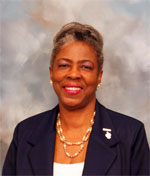 Eris Schoburgh
Eris Schoburgh Nikoli Attai
Nikoli Attai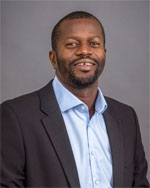 Nigel Brissett
Nigel Brissett Fatimah Jackson-Best
Fatimah Jackson-Best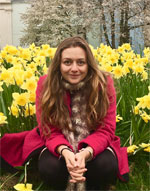 Laura Canevari
Laura Canevari Sally Stainier
Sally Stainier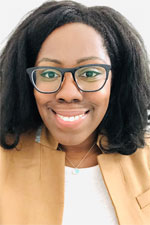 Kat Stephens
Kat Stephens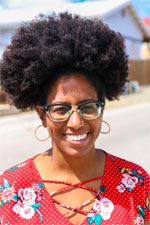 Keisha Wiel
Keisha Wiel